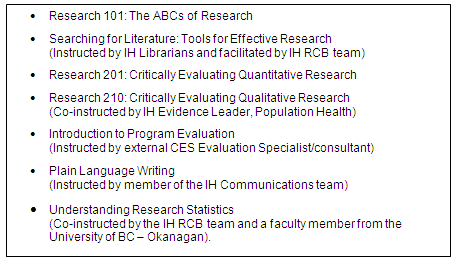Context
A strong healthcare system is driven by solid, research-informed management and policy decisions1. However, current literature on the use of existing research demonstrates haphazard, inconsistent, and unpredictable uptake of evidence in the clinical setting2, in part due to a lack of capacity to participate in research activities. Successful translation of research to practice or decision-making considers the level and/or type of evidence, the context in which it is transferred and the method of facilitation3,4: the latter two factors create key challenges in rural settings (ie geographical distance to meet in-person and a diverse set of needs and/or priority topics that warrant research support). This article outlines the planning, implementation and preliminary evaluation of a Research Capacity Building (RCB) initiative in Interior Health (IH), a predominantly rural health authority in British Columbia (BC), Canada. This article describes the key characteristics and activities of the initiative that are designed to initiate and enhance research capacity within the organization and may be translated to and/or adopted by other rural/remote health regions.
Interior Health is one of 5 geographic regional health authorities in BC, serving over 737 000 residents5 with a variety of health services, including acute care, home and community care, mental health and addictions, public health and corporate services. A significant proportion of this diverse and rapidly changing population is considered to be rural/remote (approximately 3 people/km2), which contributes to difficulties in sharing research information. Within and between each of IH's four health service areas, services are delivered through a complex regional 'network of care' that includes hospitals, community health centres, residential and assisted living facilities, mental health housing, primary health clinics, homes, schools, and other community settings6. The need to ensure that evidence drives health planning, policy, resource allocation, management, and clinical service delivery is now well recognized by IH with evidence-based practice as one of its guiding principles6. However, prior to 2005, research activity primarily involved approved clinical trials activities at regional hospitals, in addition to a few select population health and health services research projects. Recognizing the benefits of creating infrastructure to develop research capacity within the rural region7, funding was successfully attained in 2005 from the Michael Smith Foundation for Health Research, Health Services & Policy Research Support Network (HSPRSN), via a one-time BC Health Authority Capacity Building Grant. Now in its fourth year of an RCB initiative, IH has developed strategies to support evidence-informed decision-making for both urban and rural/remote areas of the health authority.
An initial assessment of IH's research capacity was conducted in 2006 using an organizational self-assessment tool8,9 distributed to individuals within IH and to local academic researchers/staff who were aware of RCB activities in the region. The majority of respondents (n = 107) considered themselves to be in clinical staff (28%) or management (24%) roles within the organization with other positions identified including physicians, researchers (IH, university or community) or support staff. This baseline assessment as well as discussions with key stakeholders revealed a need for enhanced communication of health services research results, research education and networking opportunities for staff at all levels of the organization. Staff noted barriers to using and sharing research such as lack of time, resources and skills for, as well as value placed on participating in research activities in agreement with previous literature10-13. The majority of staff were unaware of possible linkages with local academic health researchers, including faculty located at two universities within the region. In response to this initial assessment, numerous RCB activities within the health authority were implemented and are currently being evaluated by the IH RCB team.
Research capacity building activities
Previous research on RCB has found that practice-relevant activities that promote research education, dissemination and collaboration/partnership opportunities, as well as appropriate infrastructure, leadership and mechanisms for sustainability all contribute to building research capacity within health care organizations14. Building research capacity within a rural health authority such as IH has the potential to mobilize health services research information to staff making decisions about practice and policy. To increase research capacity, several activities focus on enhancing the translation of research findings to IH staff.
Regular Brown Bag Lunch research seminars (n = 23 to date) highlight ongoing health services research within the health authority and the local academic community. Presentation topics include the application of operations research/modelling to clinical practice and economic approaches to health care priority setting. Information technology support (ie video- and teleconferencing, webcasts etc) has allowed for expansion of seminars to over 350 enthusiastic participants in rural/remote communities. The IH RCB team also facilitates access to the BC Ministry of Health Strategic Policy and Research Knowledge Branch 'policy rounds', which regularly highlight provincial/national/international health services research projects and programs.
A Research Skills Workshop series addresses the need for skill-building in specific research topic areas as identified in the initial organizational self-assessment tool and stakeholder input (Fig1).

Figure 1: Interior Health Research Skills Training Workshop Series
The workshop series is delivered by a variety of instructors, including the IH RCB team members themselves, academic researchers, consultants, and members of IH Communications, Library, and Population Health teams. Learning resources/tools such as templates and checklists for writing research proposals and critiquing research literature have also been developed by team members. To ensure that research skill-building is available to more rural and remote areas, workshop materials are posted online and team members facilitate a workshop 'road show', bringing the in-person workshops to communities region-wide and allowing for greater participation from rural/remote staff. To date, over 600 staff have participated in the workshop series; the majority of participants identify as clinical staff (33%) or are within IH Public & Population Health portfolios (28%).
The RCB team also provides in-depth literature syntheses that address key priority issues for the organization's decision makers. To date, two major literature syntheses have been prepared to address the management of frail elderly and the integration of psychiatrists into community mental health settings and are based on existing, peer-reviewed research evidence. Smaller scale literature summaries and/or information briefs (n = 20 to date) have also been performed on priority topic areas in order to inform practice and policy decisions within the organization. For example, several literature summaries have helped to inform IH rural service delivery planning.
The RCB staff have continued to build collaborations between health authority staff and academic researchers, other health authorities and the BC Ministry of Health. 'Meet n greet' events involving local academic researchers and health authority decision-makers allow the opportunity to exchange research ideas and translate research findings into policy/practice. To date, several successful teams have been assembled and have received national grants to pursue research that is relevant to the rural communities within the region. In addition, a number of workshops, seminars and conferences have been co-hosted by the group and several of BC's provincial Health of Population Networks, including the BC Network for Aging Research and BC Rural and Remote Health Research Network. The RCB team works in concert with these networks, sharing a common interest in conducting, disseminating, and applying health research to BC communities, health professionals, and researchers.
Finally, an annual IH Research Conference highlights examples of regional and provincial health research projects, as well as evidence-informed policies and programs. The four conferences to date have allowed for networking opportunities among over 400 researchers, practitioners and decision-makers. The fifth annual event is planned for early 2010 with a focus on rural health services research, one of IH's priority topic areas.
Issue
The concept RCB speaks to the need for improvement in the skills and assets that can facilitate the production and application research. Research capacity building seeks to develop sustainable skills, resources, and commitment to improvement in health and other sectors to multiply health gains many times over15. Although RCB is currently a poorly defined term, its overall goal is intended to improve the ability to conduct research, to use results effectively, and to encourage a greater demand for research16. Most definitions of RCB have focused on enhancing the ability to do research; however, there appears to be growing support for a more inclusive definition that also addresses the ability to use and apply research. The use and application of existing research findings, often referred to as knowledge translation and exchange (KTE), is one means of building organizational research capacity, and is particularly important within a rural health region where time, resources, and research skills are often limited.
It is difficult to gauge the progress of RCB initiatives when there is debate as to what the optimal outcomes and indicators of success are. Traditional parameters used to evaluate RCB initiatives focus primarily on assessing the capacity to do research by looking at the development of research skills, availability of resources, and dissemination of results in the form of publications or presentations. Building research capacity within a regional health authority reflects the value of participating in research activities in addition and prior to publication in a high impact, peer-reviewed journal. As one RCB participant comments:
Research [participation] provides an opportunity for life-long learning, it will help with staff retention and empower individuals...in acute and in residential [settings].
More recent evaluation parameters, including those monitored by the IH RCB team, are assessing the capacity to both use and apply research. These approaches determine, for example, the productivity and impact of research by measuring the extent to which results are incorporated into practice and influence policy development17. The team has begun to modify an existing evaluation framework14 in order to evaluate its RCB initiatives with a rural lens. As part of this evaluation, the team redistributed its self-assessment tool in order to begin to gauge its progress. Results from the 2008 needs assessment indicate small improvements in research capacity within the organization (ie increased knowledge of academic linkages). However, barriers to research participation such as time, funding, and communication are still evident 3 years post-implementation. These barriers are not surprising given that, on average, it takes several years to build research capacity18,19.
Additional evaluation components assess the impact to date of various RCB activities on IH health service policies and practices via immediate as well as follow-up activity-specific survey feedback is gathered from the RCB activity participants. Initial survey responses (n >700), along with key informant interview feedback, have been extremely positive regarding RCB activities over its initial period of implementation. The research skills training workshop series and Brown Bag Lunch research seminars consistently receive high scores with respect to evaluating the sessions' relevance and importance to participants' work as well as the value gained for the time spent at the session.
Lessons learned
Although difficult to gauge success due to a lack of standard RCB definitions and evaluation methods, preliminary findings suggest that the provision of RCB opportunities is critical to enhancing health services research capacity within a regional health authority. Key findings from the needs assessment initially noted and continue to reveal a lack of resources for (specifically) time and funding, and communication of research within the organization; however, staff are enthusiastic about applying research findings to their work in lieu of the fact that very few positions have protected time for research activities. This enthusiasm has been instrumental to the success of RCB activities to date, as evidenced by a high level of interest and demand/wait lists for RCB sessions. Identification of research 'champions' within the organization, particularly those in leadership roles, has been critical in building capacity.
A dedicated RCB team has helped to increase the awareness and use of research within the organization. The majority (90%) of needs assessment respondents felt well prepared to use research evidence in their decisions/practice as a result of the HACB funding. One stakeholder in the organization states:
...interacting with the staff of the research team has stimulated my thinking in ways that no other individual in the organization has been able to. Although I want my staff to be pulling the literature together and frequently distilling it into very useful information upon which to build decisions as a routine part of their work, there are times where the skills and abilities of the staff in the research department get to a much broader depth.
Technological capabilities such as video-/teleconferencing and webcasts, as well as bringing research skills workshops and seminars to rural/remote sites, has allowed for a greater number of rural communities and staff to be exposed to relevant health services research. One rural workshop participant notes:
[The workshop] emphasis on practicality was excellent. If these courses were offered only in [an urban center] I would likely have not attended.
Another rural clinician says:
I have attended a number of Brown Bag Research Lunches by telephone and power-point on my computer, and find this to be another excellent continuing education opportunity.
Needs assessment respondents agree that local training events have increased the visibility of research within the region, for example the RCB team brought the workshops 'on the road' to staff in rural and remote communities.
As in previous work in the province20, creating collaborative partnerships among local and provincial academic researchers, regional health authorities and provincial research networks has been essential. Collaborations begin to alleviate barriers such as time, funding and skill set and promotes increased translation and exchange of research evidence to eager health authority staff. Partnerships facilitated between IH staff and the academic community have taken the form of informal information exchanges, working groups, instruction of workshops/lectures, third party contacts/liaisons for research project participant recruitment, provision of letters of support and/or co-investigation on research teams. As a result of building linkages between health authorities, networks, academic researchers and IH staff, a number of successful collaborative research events have been organized and several research terms have successfully obtained health services research grant funding; most recently a CIHR-funded Partnerships in Health Systems Improvement (PHSI) research team seeks to evaluate the transitioning of older persons between care settings.
The implementation of the aforementioned RCB activities has led to a heightened awareness of the value of applying research evidence to one's practices and/or decision-making. This awareness has led to a greater demand for RCB team support and increased reference to research information in many organizational and project communications. There is preliminary evidence to suggest that the information translated during the RCB activities is motivating different groups within IH to initiate their own research and/or KT strategies. For example, attending a Research 201 workshop sparked interest in members of a regional rehabilitation team to form their own journal club to critique relevant research papers among themselves. Several other departments within IH including Workplace Health & Safety, Home and Community Care, and Information Management and Technology have implemented research strategies in their program planning or consulted with the RCB team to review surveys, project charters and other planning documents. Based on the more recent evaluation work, staff in the organization cite examples of where evidence led to changes in the following IH programs and/or practices:
- Falls prevention (ie falls prevention initiatives; Strategies and Activities for Independent Living (SAIL) program; residential care fall risk screening tool implementation)
- Nursing (ie best practice in nursing care for wounds; heplock flushes; standards of transfusion practice changed in accordance with recommendations from the Canadian Standards Association and provincial Transfusion Medical Advisory Group)
- Public/Population health (ie Core Functions in Public Health - evidence-based model programs are driving changes to programs in support of quality improvement for prevention and health promotion).
Outstanding challenges include acquiring sustainable funding for future RCB initiatives, targeting the activities to the appropriate audience, managing an increasing number of requests, and the detailed evaluation of RCB strategies employed thus far. Given the current economic climate, acquiring sustainable funding for RCB initiatives remains challenging not only within healthcare, but also in a number of different sectors. Although research governance (or lack thereof) often limits clinical staffs' participation in research activities, moreover a lack of human resource capacity to backfill positions is a key barrier for front line staff participation within Interior Health. Future initiatives will aim to address gaps identified by the second distribution of the self-assessment survey, stakeholder and activity feedback, with a particular focus on effective knowledge translation strategies for the communication of high priority and relevant research evidence to decision makers. Reflecting on the lack of evaluation and best practices/methodology for studying research capacity building, this article provides an overview of activities and preliminary successes in a predominantly rural Canadian health authority.
Interior Health supports an organizational culture that strives for continual service improvement. Translating research evidence and building the research skills of IH staff through the RCB initiatives has helped to achieve new standards of excellence in the planning, management and delivery of all health services across the health authority. The use of evidence-informed decision making by IH in both policy and practice will have a significant impact on the communities it serves, ultimately raise the profile of health services research within the rural health authority, and promote a stronger health care organization.
Acknowledgements
The authors acknowledge the funding from the Michael Smith Foundation for Health Research, Health Services and Policy Research Support Network, which enabled them to implement this research capacity enhancement program. They also thank Lisa Vandenbeld for helping to facilitate many of the RCB activities described, and Trisha Kostesky for assistance with searching and summarizing literature for this report.
References
1. Canadian Health Services Research Foundation. Annual Report. (Online) 2004. Available: http://www.chsrf.ca/other_documents/annual_reports/2004/e/index.html (Accessed 21 November 2007).
2. Eccles M, Grimshaw J, Walker A, Johnston M, Pitts N. Changing the behavior of healthcare professionals: the use of theory in promoting the uptake of research findings. Journal of Clinical Epidemiology 2005; 58: 107-112.
3. Kitson A, Harvey G, McCormack B. Enabling the implementation of evidence based practice: a conceptual framework. Quality in Health Care 1998; 7: 149-158.
4. Rycroft-Malone J, Kitson A, Harvey G, McCormack B, Seers K, Titchen A et al. Ingredients for change: revisiting a conceptual framework. Quality and Safety in Health Care 2002; 11: 174-180.
5. Interior Health. Interior Health P.E.O.P.L.E. Population Projections (2009-2024). Kelowna: 2008. Available: http://www.interiorhealth.ca/uploadedFiles/Information/Reports/Population_Profiles/IHA_Profile_P34.pdf (Accessed 3 July 2009).
6. Interior Health. 2008/09-2010-11 Service plan. (Online) 2008. Available: http://www.interiorhealth.ca/uploadedFiles/Information/Health_Service_Planning/Current_Planning_Document/200809ServicePlan.pdf (Accessed 3 July 2009).
7. Kulig JC, Minore B, Stewart NJ. Capacity building rural health research: a Canadian perspective. Rural and Remote Health 4: 274. (Online) 2004. Available: http://www.rrh.org.au (Accessed 6 August 2008).
8. Canadian Health Services Research Foundation. Is Research Working for You? A self-assessment tool and discussion guide for health services management and policy organizations. Ottawa: Canadian Health Services Research Foundation, 1999.
9. Kothari A, Edwards N, Hamel N, Judd M. Is research working for you? Validating a tool to examine the capacity of healthcare organizations to use research. Implementation Science 2009; 23: 4-46.
10. Gerrish K, Ashworth P, Lacey A, Bailey J, Cooke J, Kendall S et al. Factors influencing the development of evidence-based practice: a research tool. Journal of Advanced Nursing 2007; 57(3): 328-338.
11. Farmer E, Weston K. A conceptual model for capacity building in Australian primary health care research. Australian Family Physician 2002; 31(12): 1139-1142.
12. Frontera WR, Fuhrer MU, Jette AM, Chan L, Cooper RA, Duncan PW et al. Rehabilitation Medicine Summit: building research capacity. Topics in Stroke Rehabilitation 2005; 12(4): 68-80.
13. Shah NC, Pond D, Heaney S. Research capacity building in general practice. Australian Family Physician 2002; 31(2): 201-204.
14. Sarre G, Cooke J. RCDAP - Research Capacity Development Action Pack: organisational support tool for research capacity development. Trent, UK: Research & Development Support Unit, 2007.
15. Cooke J. A framework to evaluate research capacity building in health care. BMC Family Practice 2005; 6: 44-55.
16. Bates I, Akoto AYO, Ansong D, Karikari P, Bedu-Addo G, Critchley J et al. Evaluating health research capacity building: an evidence-based tool. PLOS Medicine 2006; 3(8): 1224-1229.
17. Crisp BR, Swerissen H, Duckett SJ. Four approaches to capacity building in health: consequences for measurement and accountability. Health Promotion International 2000; 15(2): 99-107.
18. Amodeo M, Wilson S, Cox D. Mounting a community-based alcohol and drug abuse prevention effort in a multicultural urban setting: challenges and lessons learned. The Journal of Primary Prevention 1995; 16: 165-185.
19. Chavis D. Building community capacity to prevent violence through coalitions and partnerships. Journal of Health Care for the Poor and Underserved 1995; 6: 234-245.
20. MacLeod MLP. Building bridges with decision-makers: rules for rural and remote health researchers. Rural and Remote Health 6: 567. (Online) 2006. Available: http://www.rrh.org.au (Accessed 6 August 2008).



